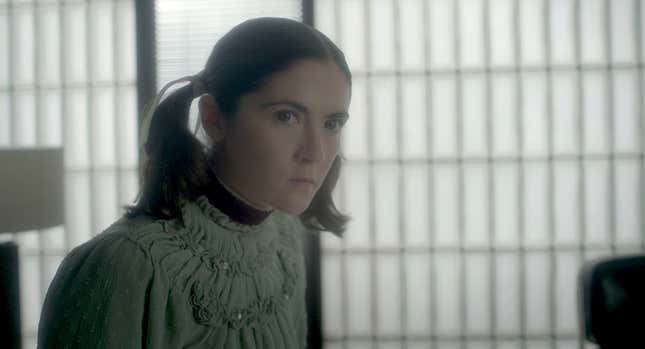‘Orphan: First Kill’ Outdoes Its Predecessor With a Deliciously Trashy Twist
Devoid of social messages and full of amorality, this prequel is pure dopamine.
EntertainmentMovies

It would be an exaggeration to call the new Orphan prequel’s amorality refreshing, but not that big of an exaggeration. The William Brent Bell-directed Orphan: First Kill is a horror movie mostly devoid of modern pretensions. It contains no serious attempt to graft pseudo-sociology onto the movie’s body count as an instant mea culpa. For our blood lust, we are not taxed with teachable moments or beaten over the head with a theme that has long been native to the genre, like trauma. Lean and mean, Orphan: First Kill is, if not fully aware of its trashiness, then at least unafraid of it.
The twist that made the preceding film, 2009’s Orphan, so delicious is revealed early on in First Kill. And this movie, in turn, manages a twist to outdo that one, which I will discuss in this review. This is your spoiler alert.
Leena (Isabelle Fuhrman) is the central figure of the Orphan franchise. She’s this series’ Freddy/Jason, but her point of view is prioritized, particularly in First Kill, which makes her the de facto protagonist. It seems strange to call someone who kills with her bare hands and slips a dead rat into her adoptive mother’s smoothie an “antihero,” but here we are. Leena is, effectively, a Chucky doll with a pulse. She looks like a child as a result of a “gland disorder” that causes “proportional dwarfism,” explains a worker at the psychiatric hospital in Estonia where she is being held at the start of the film. “Leena uses her affliction as much as she suffers from it,” he continues. “She’s an exceptional con artist.” She is extremely good at insinuating herself into people’s lives, as we learned in the last movie. (The twist there was that she was an adult the whole time her adoptive family, not to mention the audience, was led to believe she was a kid.)
Played with mercurial nuance by Fuhrman (who is actually 25), Leena literally spits and claws her way through the movie after escaping the facility à la Michael Myers. She shares his boogeymanish ability to become undetectable to the human eye, only to pop up out of nowhere, as she does before maiming the art therapist whose car she stowed away in for her freedom. As if apparent teleportation isn’t silly enough, she searches the internet for missing children and, wouldn’t you know it, discovers she’s a ringer for a missing child out of Darien, Connecticut, named Esther. To escape her country/situation, Leena resolves to become Esther, and all it takes is a few ribbons to cover up her decidedly mature hesitation marks.
-

-

-

-

-

-

-

-

-

-

-

-

-

-

-

-

-

-

-

-

-

-

-

-

-

-

-

-

-

-

-

-

-

-

-

-

-

-

-

-








































